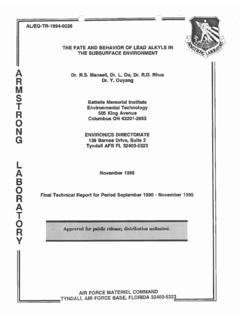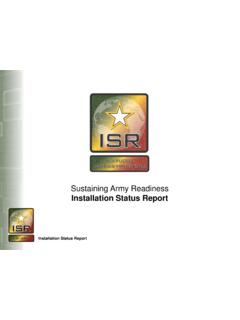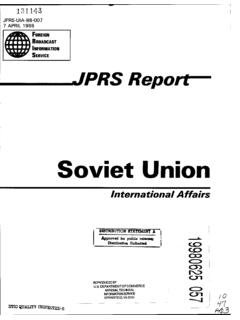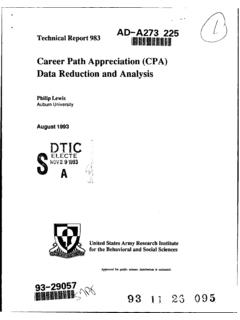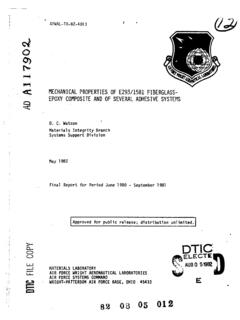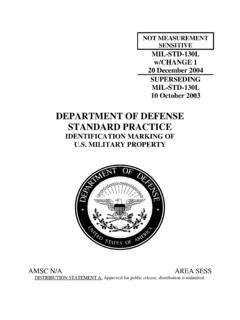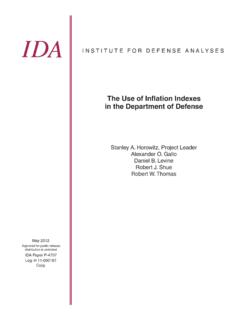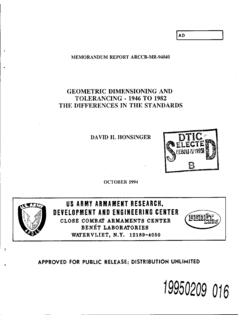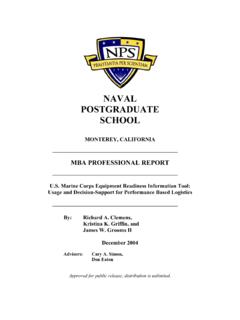Transcription of STRATEGIC RATIONALITY IS NOT ENOUGH: HITLER AND THE ...
1 STRATEGIC RATIONALITY IS NOT ENOUGH: HITLER AND THE CONCEPT OF CRAZY STATESAD-A243 579 DTDfo ulctiw n ce tThi document has been approvedhi 1 Iditrjbution is JablonskyStrategic Studies Army War CollegeSSI PROFESSIONAL READINGS INMILITARY STRATEGYP revious PublicationsChurchill: The Making of a Grand StrategistColonel David JablonskySun Tzu and Clausewitz: The Art of Warand On War ComparedDr. Michael 1. HandelForthcomingEisenhower as StrategistDr. Steven MetzUnclassifiedSECURITY CLASSIFICATION OF THIS PAGEForm AppovedREPORT DOCUMENTATION PAGE OMBNo. 0704-ala. REPORT SECURITY CLASSiFICATICN lb RESTRICTIVE MARKINGSU nclassified SECURITY CLASSIFICATION AUTHORITY 3 DISTRIBUTION/ AVAILABILITY OF REPORT2b. DECLASSIFICATION/DOWNGRADING SCHEDULE Approved for public release;distribution unlimited4.
2 PERFORMING ORGANIZATION REPORT NUMBER(S) 5. MONITORING ORGANIZATION REPORT NUMBER(S)ACN 91021Ga. NAME OF PERFORMING ORGANIZATION 6b. OFFICE SYMBOL 7a. NAME OF MONITORING ORGANIZATIONS trategic (if applicable)Studies Institute AWCI6c. ADDRESS (City, State, and ZIP Code) 7b. ADDRESS (City, State. and ZIPCod.) Army War CollegeCarlisle Barracks, -A 170!2-:u5C8a. NAME OF FUNDING/SPONSORING 8b OFFICE SYMBOL 9. PROCUREMENT INSTRUMENT IDENTIFICATION NUMBERORGANIZATION (if applicable)8C. ADDRESS (City, State, and ZIP Code) 10. SOURCE OF FUNDING NUMBERSPROGRAM PROJECT TASK IWORK UNITELEMENT NO. I NO. NO. CCESSION NO1 TITLE (Include Security Classification) STRATEGIC RATIONALITY is Not Enough: HITLER and the Concen nf CrrA~v qf12 PERSONAL AUTHOR(S)Jablonsky, David13a.
3 TYPE OF REPORT 13b. TIME COVERED 14. DATE OF REPORT (Year, Month, Oy) 1S. PAGE COUNTF inal FROM TO 1991 Augut 816, SUPPLEMENTARY NOTATION17 COSATI CODES 18. SUBJECT TERMS (Continue on reverse of necessary and identify by block number)FIELD GROUP SUB-GROUP strategy; STRATEGIC RATIONALITY ; HITLER ; ThirdI Reich; crazy states19. ABSTRACT (Continue on reverse if necessary and identify by block number)In this report the author explores the concept on rogue or "crazy" states inthe international community, an important topic in the increasingly multi-polar and dangerous world of the post-cold war era. In such an environment,the author concludes, after examining the progressive craziness of the ThirdReich under Adolf HITLER , the rational basis for strategy breaks RATIONALITY is simply not sufficient to gauge the behavior of suchstates in the international arena--a particularly dangerous turn of events inan era of mass destruction weapons DISTRIBUTION/ AVAILABILITY OF ABSTRACT 21.
4 ABSTRACT SECURITY CLASSIFICATIONMUNCLASSIFIEDIUNLIMITED C3 SAME AS RPT. 0 DTIC USERS 17nc1aSv fi Pd22. NAME OF RESPONSIBLE INDIVIDUAL 22b TELEPHONE (Include Area Code) 22c. OFFICE SYMBOLM arianne P_ Cowli-na 1 (717) 245-3001 1 AWgTDO Form 1473, JUN 86 Previouseditonsareobeole. SECURITY CLASSIFICATION OF THIS PAGEU nclassifiedSTRATEGIC RATIONALITY IS NOT ENOUGH: HITLER AND THE CONCEPT OF CRAZY STATESC olonel David JablonskyAugust 8,1991 Professional Readings in Military Strategy, No. 3 STRATEGIC Studies Army War CollegeCarlisle Barracks, Pennsylvania91-18169Il E II I I E Ell lilU The views expressed in this report are those of the author and do notnecessarily reflect the official policy or position of the Department of theArmy, the Department of Defense, or the Government.
5 This book isapproved for public release; distribution pertaining to this publication are invited and may beforwarded to: Director, STRATEGIC Studies Institute, Army War College,Carlisle Barracks, PA 17013-5050. Comments also may be conveyed bycalling the author via commercial (717)245-3275 or AUTOVON drawings by David Levine. Reprinted with permission from TheNew York Review of Books. Copyright(c) 1983-90 Nyrev, Af..ABy ..J ; :,..-y ..Dit ibutfonI i Sw'. al 'c: ! crDist eiaI 'CONTENTSFO R EW O RD .. vCHAPTER 1. INTRODUCTION .. 1 CHAPTER 2. RATIONALITY AND THEMEANS-ENDS CONNECTION .. 5 CHAPTER 3. OPERATIONAL CODEAND THE COGNITIVE TRAIL .. 9 THE PERSONAL LINK .. 11 THE CULTURAL LINK .. 13 COGNITIVE DISSONANCE AND CONSISTENCY.
6 15 CHAPTER 4. STYLE .. 21 PRAGMATISM, TECHNIQUE AND HUBRIS .. 22 PERSONAL STYLES AND THE STRUCTUREOF DECISION MAKING .. 26 CHAPTER 5. RISK .. 31 CHAPTER 6. THE EXTRARATIONAL FACTOR .. 39 THE GREAT SIMPLIFIER .. 40 IDEOLOGY AND CHARISMA .. 42 THE RATIONALITY OF IRRATIONALITY .. 45 CHAPTER 7. GOALS AND ORGANIZATIONS .. 49 CRAZY GOALS .. 49 CRAZY REALITY .. 52 CHAPTER 8. EXTERNAL ACTION CAPABILITIES .. 55 REALIZATION VARIABLES -IRRATIONALITY INPREPARATION .. 56 REALIZATION VARIABLES -IRRATIONALITY INEXECUTIO N .. 59 WEAPONS OF MASS DESTRUCTION .. 62 CHAPTER 9. THE WAY AHEAD .. 67oIIITHE MUNICH 70 THE VIETNAM METAPHOR .. 74 THE SUMMING UP .. 77 ENDNOTES .. 81 ABOUT THE AUTHOR .. 105 FIGURESF igure 1. Pure Rational Decision Making.
7 3 Figure 2. Change and Understanding in Decision 16 Figure 3. STRATEGIC Risk and Gain .. 32 Figure 4. Prisoner's Dilemma .. 40 Figure 5. Capabilities for External Action .. 55ivFOREWORDThe formulation of strategy at any level can normally bedefined as a rational process in an instrumental sense, sincethe procedure involves the calculated relationship of ends andmeans. That calculation, in turn, includes the search for somemeasure of commensurability between means and that does not occur, strategists normally chose one, ora combination, of three options: increase the means, adjust thestrategic concept, or change the what if a national leader does not recognize therational basis of strategy formulation? From a cultural orreligious standpoint, for instance, what if national elites aremotivated by a success through failure martyrdom outlook?
8 Orequally important, what if leaders promote national goals thatare beyond the pale in terms of humanity or sanity and setabout achieving them in an instrumentally rational manner? Inall these instances, as this study of the policymakers and thedecision-making structure and process of Nazi Germanydemonstrates, STRATEGIC RATIONALITY is not enough to gauge thebehavior of such nations in the international arena. From aWestern point of view, in fact, such nations are out of strategiccontrol and have become "crazy" concept of crazy or rogue states is important for thepost-cold war era, since the breakdown of the superpowerbipolar nexus, although reducing East-West tensions, is alsomitigating the pattern of client state stability.
9 Historically, mostrogue nations have remained isolated, local phenomena. Butmodern technology offers even the smallest crazy state thepotential to build up significant power, particularly withweapons of mass destruction, to influence regional, if notglobal events. For such a dangerous, interdependentenvironment, there are many lessons to be drawn from theprogressive radicalization of the Third Reich under Adolf G. CERJANM ajor General, ArmyCommandantvCHAPTER 1 INTRODUCTIONT here is an historical tendency to measure internationalbehavior against familiar styles and norms. One reason, forexample, why the threat posed by Napoleon was only graduallyrecognized, was that previous events, even Louis XIV'sattempt at European hegemony, had accustomedpolicymakers to international actors who desired only tomodify, not overthrow, the existing system.
10 ' In this century,there was a similar failure of perception in terms of therevolutionary character of Adolf HITLER and his regime. Thatfailure, followed hy the most ferocious conflict in history, hasremained a cause and effect id6e fixe for Westernpolicymakers ever since. President Truman's intervention inKorea, for instance, was due in part to his perception of howeasy it would have been to suppress Nazism in 1936 if therehad been some reaction to the German remilitarization of theRhineland. And Anthony Eden, a veteran of the diplomaticbattles in the interwar years, acted in the 1956 Suez crisis onthe basis of his memories of the Munich Conference and hisconviction that Nassar was another Finally, there wasPresident Johnson, rejecting a proposal to pull troops outof Vietnam, "because we learned from HITLER at Munich thatsuccess only feeds the appetite of aggression.
